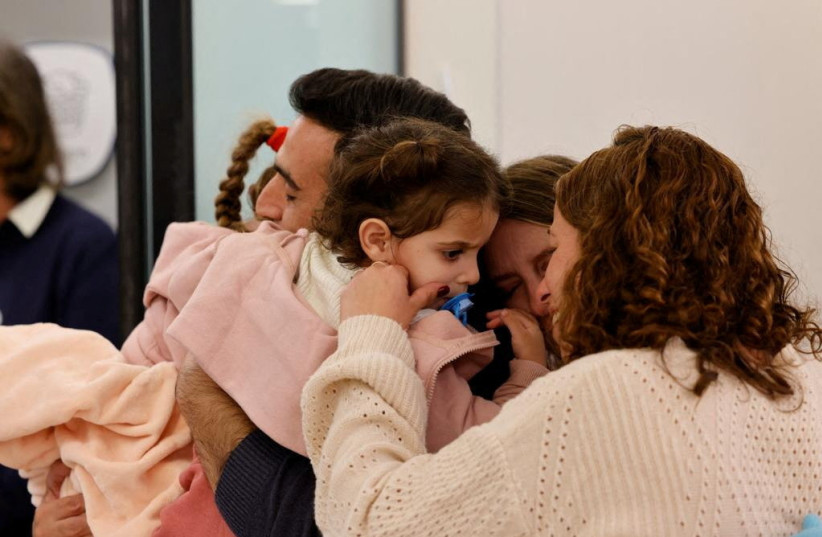After families of hostages told the harrowing accounts of October 7, how their family members were killed and kidnapped to Gaza at a press conference in London, news reporters asked questions about their concern for Palestinian prisoners and asked if they support a ceasefire.
The family members of several hostages attended the press conference at the Israeli embassy in London on Thursday.
The conference began with the family members recounting their experiences and their family members’ experiences on October 7 at several of the Kibbutzim and at the Nova Music Festival.
Orit, the mother of Almog Meir, one of the hostages taken from the Nova music festival, shared her son's story as she swallowed her tears.
“Almog, my son, is a happy boy, loved by everyone, by everybody, and sensitive. He has a special bond with his grandfather…who had lower back surgery two weeks before Almog was kidnapped. The grandpa was handicapped, and Almog [helped him] shower on a daily basis. Think about how it affects us all, how I miss him. I miss the coffee we used to drink together, I miss our arguments and our daily conversations, what a big crisis our life hit. Our life has come to a hold.”

She then pleaded for help from the Western world to bring her son home. She also thanked the IDF for “doing everything possible to return the hostages.” The other family members shared similar stories.
The father of another hostage spoke. His son was a 19-year-old soldier when he was kidnapped while patrolling the border.
“[My son] was kidnapped along with all his team while trying to defend the border, while trying to avoid the invasion of Hamas, trying to avoid the murdering and killing and slaughtering and raping of Israeli civilians," he said. "My son is 19. He is just a boy, a normal boy like every other boy.”
After several testimonies, the room was opened for questions. The first reporter from the BBC asked if the families of the hostages would support the Hamas-proposed ceasefire. One family member responded that they only want their family members to be returned. A relative of a released hostage said that Hamas only wants a ceasefire to stay in power and said Hamas should return the hostages as part of a humanitarian agreement, but that is in the hands of Hamas.
Reporters highlight the humanitarian crisis in Gaza
Another reporter asked if they support the ongoing operation in Gaza, highlighting the humanitarian suffering of Palestinians. The families of the hostages kept responding that they just wanted any action to be taken to bring their family members home. One family member brought up that Hamas is to blame for the humanitarian suffering in Gaza, as they use their population as human shields.
The father of the 19-year-old soldier tried to make an appeal to Western reporters, arguing that this is an international problem and that Israel is only the first frontier. He argued that the Western world would be next if the terrorists are not stopped, highlighting the terror attacks that have already occured as a result of Islamist jihad.
Another reporter later asked, “What is it do you say to the families of the thousands of Palestinian prisoners, many of whom are held without trial and were taken from their homes as well and are also waiting for them to come back?”
After this question, one of the family members called the question “ridiculous.”
Other family members asked how they could compare their innocent children and family members taken as hostages to criminals, murderers, and terrorists. One of the family members asked how they would feel if it were their family members who were held hostage.
The final question was regarding the silence of the UN and other women's rights organizations in light of the growing evidence and report on the rape and abuse of women in the Hamas attacks and released hostage testimonies.
The family members called these organizations “hypocrites.” The father of one of the hostages said, “This shows big hypocrisy. We are all human beings, and evil must be destroyed.”
Only one reporter asked if the Israeli government had shared any information regarding the status of any of their loved ones held in Gaza. The family members said the government does not know and cannot share anything because the Red Cross has not visited the hostages held in Gaza, although it had been promised.
One of the family members asked them to pressure the Red Cross to visit the hostages. She appealed to the reporters, “Please try to imagine they are your families as well. They are not just posters. Everyone has a family, everyone has dreams, everyone wants a life, wants to live.”
